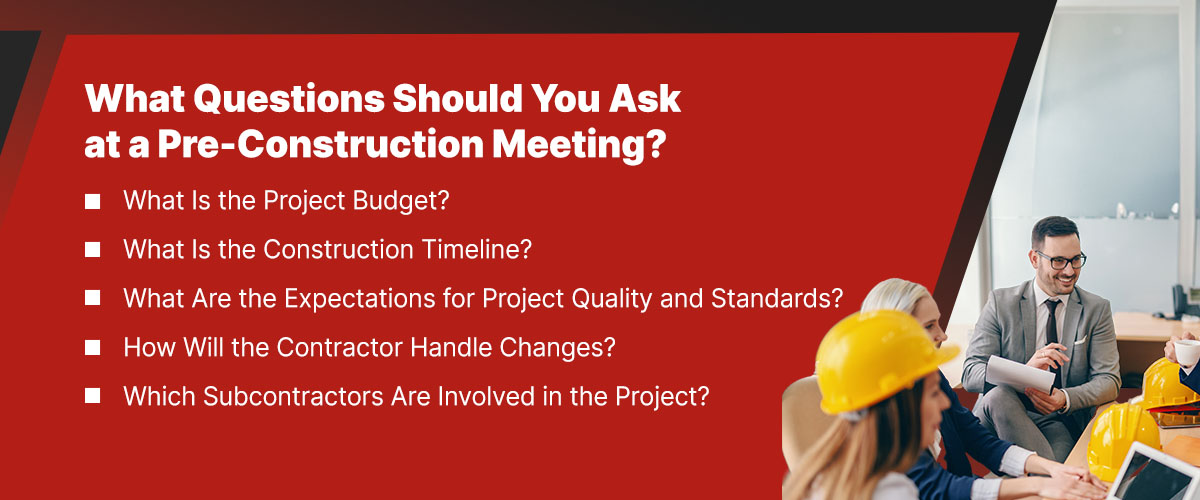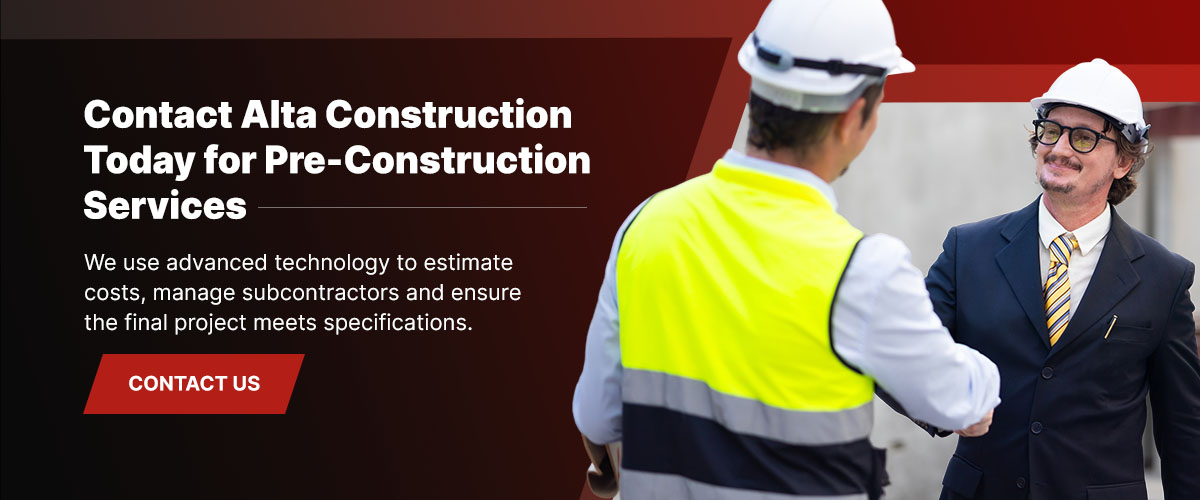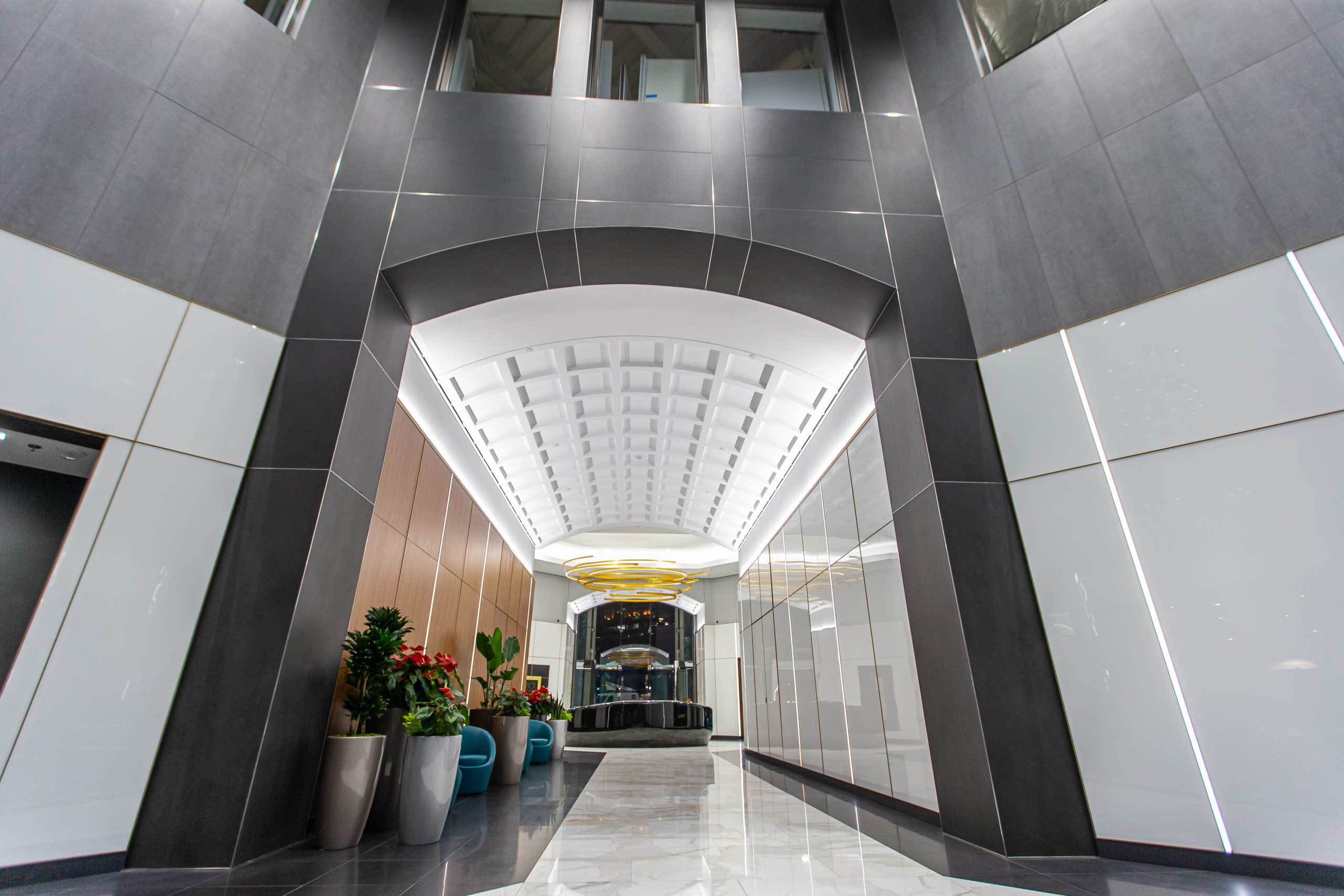
Beginning a commercial construction project requires a lot of time and money. If you do not plan properly, it will cost you even more. With only 8.5% of construction projects completed on time and within budget, you must plan early. If everyone on your team is on the same page, your project may be one of the few finished within its timeline and budget.
But how can you build a strong foundation for your project? The answer is a well-planned pre-construction meeting where you discuss your project as a team. Asking relevant questions at these meetings will give you a solid foundation and minimize surprises.
This short guide will outline what a pre-construction meeting is, why it matters and what to ask.
What Is a Pre-Construction Meeting?
As the name implies, a pre-construction meeting happens before a construction project starts. The project manager will set up the meeting and invite all stakeholders.
In the meeting, the client and the project team will:
- Establish authority and communication
- Define responsibilities
- Voice concerns and outline possible obstacles
- Request changes
- Plan the schedule and timeline
Why Do Pre-Construction Meetings Matter?
Once your project begins, unexpected obstacles and miscommunication will be costly. Poorly planned projects with ambiguous specifications will remain uncertain when construction begins. Missing subcontractor building plans can become a rework. Undiscovered site conditions can become expensive holes.
Pre-construction meetings allow stakeholders to meet each other and raise any questions. The meeting will delineate a specific vision for the project and foster a sense of collaboration.
In the meeting, the stakeholders will review project details, solidify plans and ask questions. Because change orders lead to cost and time overrun, the goal is to make the vision coherent and predict any obstacles.
What Should Be Discussed at a Pre-Construction Meeting?
Every pre-construction meeting is a little different. The project specs, timeline and people involved will set the agenda. You will likely begin with introductions to establish the hierarchy of communication and authority early on.
The group will spend most of their time reviewing documents, processes and standards. Some possible items to consider include:
- The contract
- Insurance
- Weather delays
- The budget
- The schedule
- Extensions
- Site conditions and access
- Safety concerns
- Document handling
- Drawings and blueprints
- Building permits
- The chain of command
Questions to Ask at a Pre-Construction Meeting
Preparing pre-construction meeting questions will ensure you do not forget to ask anything while you have the chance. Listing your questions about the budget, timeline or site conditions will help you maximize your time.

If you are unsure what to ask, here are some examples.
1. What Is the Project Budget?
First, agreeing on the budget will set realistic expectations for the project. If you and the contractor have a definite idea of the expenses, you can plan accordingly.
When discussing project costs, ensure you understand the cost breakdown, payment schedule, budget change process and any potential contingencies. You can also ask about any strategies that may prevent overspending.
2. What Is the Construction Timeline?
Reviewing the construction timeline will allow you to avoid future delays or conflicts. Discussing what needs to happen and when will give everyone a straightforward idea of their responsibilities. You can also agree on a completion date. Staying on a set schedule keeps projects on time and within budget.
3. What Are the Expectations for Project Quality and Standards?
Defining expectations before construction begins will prevent conflict further down the road. To understand the construction team’s processes, ask about their quality standards, safety practices and portfolio.
Some factors that can affect your project’s quality and timeliness include:
- Its scope and complexity
- Weather conditions
- Availability of materials and labor
- Unexpected events
Appreciating the contractor’s history and philosophy will allow you to anticipate how it handles these variables.
4. How Will the Contractor Handle Potential Changes?
Changes during construction can delay the timeline and increase costs. While you cannot plan for every problem that may pop up, you can create a process that will mitigate the effect adjustments have on your project’s schedule and budget. Planning for possible revisions will allow team members to make quick and effective decisions when issues arise.
When discussing the process, ask about the costs associated with potential changes and timeline flexibility. Establishing a point of contact may also be beneficial when you need to modify part of the plan.
5. What Subcontractors Are Involved in the Project?
Knowing which subcontractors will work on your project lets you understand what you can expect from each team member during construction. If the different teams are unsure of various subcontractors’ responsibilities, this confusion may lead to frustrating and expensive delays.
By discussing who the subcontractors are and what they do, you can establish a precise line of communication and keep your team on the same page.

Contact Alta Construction Today for Pre-Construction Services
Alta Construction is a full-service construction company with multiple locations across the United States. With years of experience, our team can transform your visions into reality. Our team offers a full range of construction services in multiple specialized industries:
- Big-box retail
- Gyms and fitness centers
- Cannabis dispensaries
- High-end retail
- Commercial offices
When you partner with us, you will benefit from our transparency and excellent customer service. We use advanced technology to estimate costs, manage subcontractors and ensure the final project meets specifications. You will always have access to user-friendly, easy-to-read dashboards where you can view progress, send messages and get updates.

